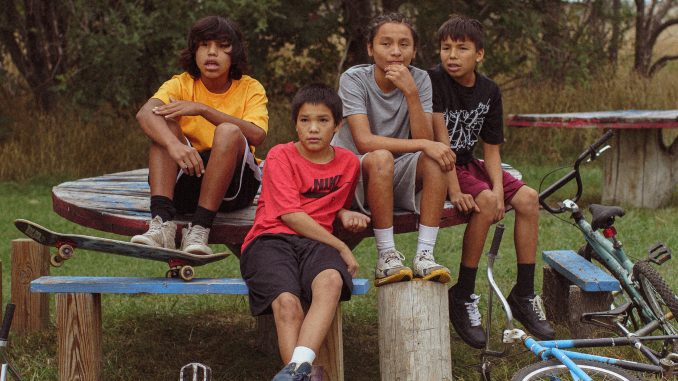
What new films have made their way through the Stream & Dream Lounge recently?
War Pony In generally lively fashion, War Pony functions variously—as an offbeat modern western, as a fractured and darkly picaresque coming-of-age tale, and as a sprawling, dark-humored social document.
Filmed on the Pine Ridge Reservation with a young cast that is predominantly Oglala Lakota, this mini-epic tracks the separate but adjacent adventures and misfortunes of two males—23-year old Bill (Jojo Bapteise Whiting) and 12-year old Matho (LaDamian Crazy Thunder). Both are free spirits in trouble—Bill roams about in his beat-up car, juggling relationships with the mothers of his several children and scrambling for opportunities to find jobs that pay well. Matho and his pals skitter about on their bikes looking for fun and mischief and the occasional chance to make a buck or two. And after his abusive father kicks him out of the house, Matho is also scrambling to find places where he can spend the night.
Co-directors Gina Gammell and Riley Keough tell these stories via briskly moving fragments peppered with details that suggest continuities and connections, most of which remain intriguingly implicit. The lead performances have the offhanded conviction of classic neorealism.
Surrounded After serving as a “Buffalo Soldier” in the Civil War, Mo Washington—disguised as a male (and played by Letitia Wright)—travels west toward the plot of land she’s claimed. Her stagecoach journey is cut short by an armed holdup that puts her at odds with a bumptious bandit and his gang. Her savvy and skills with a pistol figure in the ensuing violence, which disperses the gang and affects the capture of the bandit, the swaggering Tommy Walsh (Jamie Bell). But then she’s left to hold the bandit captive while the sheriff takes the wounded to safety.
The cat-and-mouse sparring that emerges during the overnight stay grows even more fraught with the late-night visit of a mysterious stranger (the late Michael K. Williams in his final role). As dawn breaks, the gang is returning, with the lawmen not far behind. The violent skirmish that ensues settles things plot wise and sends Mo off in a crushing haze of hard-won, and very solitary, glory.
It’s a gunfighter tale with some vividly offbeat twists to it, but there’s nothing simpleminded about its stark mixture of moral quandaries and jagged social issues—race, gender, justice and its opposite, personal integrity and more. The brilliantly realized action scenes are punctuated with tense dialogue scenes that sometimes get a little heavy-handed, but still play nicely into the overall dramatic momentum.
Wright plays the paradoxes of her role with a grace that is both ferocious and dignified, and Bell brings a mercurial passion to the bandit’s sly ravings.
The Unknown Country Alone and mourning the death of her grandmother, Tana (Lily Gladstone) leaves snowy Minnesota in the Cadillac she’s inherited and heads for South Dakota—for a friend’s tribal wedding first of all and then for reunions with friends, family and tribal elders—and then, in homage to a memorable voyage her grandmother once took, deep into Texas, partying in Dallas and then trekking to a very special place in Big Bend country.
It’s a gently revelatory journey of recovery and renewal, much of which is reflected cumulatively in moments of scenic imagery and action rather than explicit emoting and dialogue. The journey from chilly isolation to a quietly radiant kind of rapture is reflected in Gladstone’s subtly compelling performance and, no less effectively, through seemingly random glimpses of people and places that Tana encounters, sometimes directly, sometimes not.
Writer-director Morissa Maltz, a documentary filmmaker most of the time, here mixes scripted material with snippets of cinema vérité-style footage. The wedding scene is an actual ceremony involving a Sioux couple who were already cast as friends of Tana. (The bride, Lainey Bearkiller Shangreaux, also shares screenwriting credit with Maltz and Gladstone). And several secondary characters are portrayed through moments from Maltz’s documentary-style encounters with the actual folk.
Sam Now Sam and Reed Harkness are brothers, but with different mothers. Beginning in childhood, while being raised by their father with neither mother present, the two boys begin making home movies together, with Sam sometimes playing a fantasy hero dubbed the Blue Panther. Reed, who is the older of the two, will become a director of documentaries as an adult, but before that the two of them set on the idea of making a film about their search for Sam’s mother, a beloved lady who one day walked away from the entire family and has not been heard from since.
Sam Now, directed by the adult Reed in collaboration with Sam, is the film that resulted, with footage from two decades of their lives portraying that search and much more. As the title suggests, the film is a portrait of Sam, a young man confronting the trauma and mystery of maternal abandonment. But the portraiture extends to a great deal more—to Sam’s mother, Jois, certainly, but also to Reed’s mother; to their two other brothers, including Jois’ other son, Jared; to their sad but resilient father, who gradually warms to their task as well; and, implicitly, to Reed himself. Brilliant editing of personal footage from a variety of times and sources makes Sam Now an even more compelling movie experience.

Be the first to comment